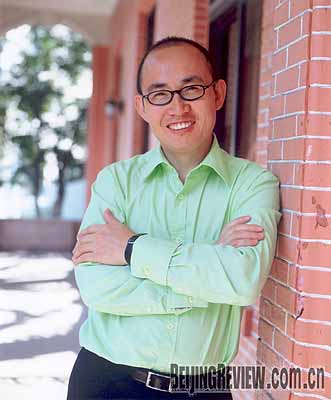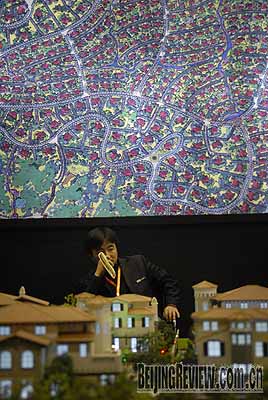| The Central Government gave a clear sign of where it wants the country's property market to go when the State Council rejected a recent initiative in Chongqing to revive local real estate investments by offering new mortgage holders personal income tax rebates as high as 40 percent.
|

|
|
"The property market will regain its confidence only when the transaction volume climbs. The shrinking transaction volume indicates potential buyers are still unhappy with the prices." --Pan Shiyi, Chairman of Soho China Ltd. (COURTESY OF SOHO CHINA) | Later news reports said the State Council only demanded more details about how Chongqing would implement the policy. Soon on January 9, Jiang Weixin, Minister of Housing and Urban-Rural Development, stressed at a national housing and urban-rural development working conference in Beijing that local governments this year would not be allowed to introduce more tax and fiscal policies to spur real estate market growth without permission from the Central Government, and that they should instead encourage real estate developers to actively slash prices in order to sell apartment overstocks.
"Chongqing's incentive plan was against the basic principle of personal income taxation, that is to tax the rich to pay the poor, and thus impaired taxpayers' interests by asking all taxpayers to share the bill of new home buyers," said Shi Hanbing, an equities and real estate market analyst with Shanghai Security News.
 |
|
ANEMIC DEMAND: The housing prices in Beijing are still much higher than what ordinary buyers can afford. The Beijing Autumn Housing Fair last October was visited by much fewer potential home buyers (WEI YAO) | But whatever measures the Central Government takes, its ultimate goal is to boost housing sales transactions, not prices, and to resuscitate the real estate market instead of property developers, Shi said.
Local government intervention in China's property market has recently sparked huge debate as some municipal administrations have moved away from encouraging buyers to purchase homes to adopting measures that seemingly prop up prices and subsidize property developers who are reluctant to slash prices and cut their profits.
In another move to stimulate the property market, the Central Government decided to invest more in housing projects for low-income urban families and pledged to offer some 1.3 million units of economically affordable housing annually from 2009 to 2011 nationwide. Yet, since last November, many municipal governments have resorted to shortcuts--instead of starting more affordable housing projects, they have planned to buy unsellable apartments from property developers to increase affordable housing supplies or subsidize households eligible for government-funded affordable housing projects to buy middle-end residential apartments.
Some cities such as Hangzhou and Shanghai even have considered renewing the policy for rural dwellers to obtain urban-resident certificates, which would ensure them better education and health care in China if they bought homes in the cities.
Pan Shiyi, Chairman of Soho China Ltd., said local governments that buy vacant commercial homes would help transform the country's property market from a commercial housing-dominated one to one where most of the housing is government-funded.
"It will be a better solution to problems during the transition," he said in an interview with Beijing Review.
Keep the engine running
China's real estate market, barely existent a decade ago, encountered its first big downturn in 2008. The Central Government had been deflating a housing-market bubble since 2005 and started to see its efforts paying off.
Last December, the country's housing prices dropped 0.4 percent from a year earlier, the first decline on record, and the total area of homes sold last year plummeted 20.3 percent as slowing economic growth deterred homebuyers, according to the National Bureau of Statistics (NBS). Prices for new homes in the southern city of Shenzhen tumbled 18.1 percent last December, the largest decline among all 70 large and medium-sized cities surveyed.
A cooled-off property market is the last thing the government wants amid the global economic slowdown, although tamping down the housing market has long been a Central-Government objective. During the past decade, property-related activities became a major growth engine and have accounted for a considerable chunk of local government revenue in China.
| 